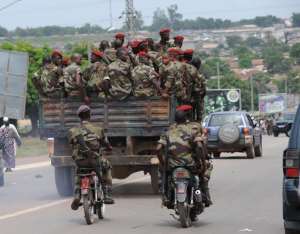
Abidjan (AFP) - Former Ivory Coast rebels whose support helped bring Alassane Ouattara to power are increasingly wreaking havoc, with the government seemingly unable to rein them in.
Numerous incidents involving ex-rebels over the past six weeks -- including a strike by soldiers which brought the country to a halt -- culminated on Friday with shots being fired in the economic capital Abidjan after an ex-militia leader was arrested.
Despite the escalating defiance, Ouattara appears unwilling or unable to confront the same forces that aided his ascent to the presidency following his 2010 election victory.
"These outbreaks of anger happen, but each time they do, order is restored," government spokesman Bruno Kone said.
Nevertheless, the image a calm and orderly Ivory Coast vaunted by the government has crumbled with every act of insubordination.
In mid-November, a strike by former rebels who have since joined the army ground the country to a standstill after spreading to Abidjan from Ivory Coast's second city Bouake.
The nearly 9,000 strikers, who joined the army between 2009 and 2011, were demanding full payment of backpay and promotions. Two days after inviting their leaders to meet him, Ouattara agreed to their demands.
- 'Pandora's box' -
"Ouattara opened a Pandora's box," one Western analyst said.
"He bought himself peace in the barracks until presidential elections" in October 2015 -- which he is favourite to win -- but in so doing "created a precedent (and) probable instability", the analyst added.
A Western security official said Ouattara's error was to "wait three years to neutralise the rebels, to shut them away. Now (taking action) will be more and more difficult."
Successive waves of defiance have spread across the country in recent weeks from the ex-rebels' Bouake stronghold.
The northern city was capital of a rebellion that split Ivory Coast in two after it tried to push former president Laurent Ggagbo from power in a 2002 coup attempt. That partitioning of the country sparked a decade of crises.
After an agreement was reached to hold presidential elections in December 2010, the Gbagbo camp refused to acknowledge Ouattara's victory, unleashing militias responsible for five months of violence that left around 3,000 people dead.
Amid international condemnation of Gbagbo, former rebel forces moved into Abidjan in 2011 and eventually encircled Gbagbo's position. Gbagbo was then captured and delivered to the International Criminal Court, which will try him for "crimes against humanity" in July 2015.
Those same ex-rebels who helped Ouattara assume power have become pillars of his regime. Many of the rebels' most notorious "com'zones" (zone commanders) now sit atop the security apparatus.
- 'Decapitation of rebellion' -
The International Federation for Human Rights (FIDH) in December denounced the impunity that ex-rebel militia leaders have enjoyed, including Losseni "Loss" Fofana, who remains head of security for the whole west of the country despite his alleged involvement in a massacre at Duekoue in March 2011 in which "hundreds died".
Another, Issiaka "Wattao" Ouattara, is said to have been sent to Morocco for military training.
Even those who aren't untouchable remain influential.
When former rebel chief Salif "Tractor" Traore was arrested in his luxurious home in Abidjan on Friday, one of his men was killed in the scuffle, others fired guns in the air to vent their fury. Soldiers equipped with rocket launchers had to be brought in to restore calm.
The flare-up was described as a "consequence of the (post-electoral) crisis" by government spokesman Kone. The delicate task of taking on defiant ex-rebels, he says, is a problem the government is "treating little by little".
Indeed, Traore's arrest came amid accusations he ordered a road block Thursday near Abidjan's largest military camp. The soldiers responsible were "immediately consigned to their barracks" awaiting dismissal, the Defence Ministry announced.
"The decapitation of the rebellion is underway in Abidjan," said a Traore supporter. "The president would be better off moving to protect the people who liberated him."
Another agreed by way of a warning.
"They've forgotten who put them in power. We're not playing a game of intimidation, but if we're forced to, that's what we'll do."




 Akufo-Addo spotted ordering chiefs to stand for his handshake
Akufo-Addo spotted ordering chiefs to stand for his handshake
 Akufo-Addo ‘disrespects’ every chief in Ghana except Okyenhene — NDC Communicato...
Akufo-Addo ‘disrespects’ every chief in Ghana except Okyenhene — NDC Communicato...
 Supreme Court clears way for dual citizens to hold key public positions
Supreme Court clears way for dual citizens to hold key public positions
 Be transparent, don’t suppress the truth – Prof. Opoku-Agyemang to Jean Mensa
Be transparent, don’t suppress the truth – Prof. Opoku-Agyemang to Jean Mensa
 ‘I won’t tell the world I was only a driver’s mate during challenges’ – Prof Jan...
‘I won’t tell the world I was only a driver’s mate during challenges’ – Prof Jan...
 We’ll prosecute corrupt officials of Akufo-Addo’s govt – Prof Jane Naana
We’ll prosecute corrupt officials of Akufo-Addo’s govt – Prof Jane Naana
 [Full text] Acceptance speech by Prof Jane Naana Opoku-Agyemang as 2024 NDC Runn...
[Full text] Acceptance speech by Prof Jane Naana Opoku-Agyemang as 2024 NDC Runn...
 Election 2024: Don’t be complacent, we haven’t won yet – Asiedu Nketia cautions ...
Election 2024: Don’t be complacent, we haven’t won yet – Asiedu Nketia cautions ...
 Election 2024: Stop fighting over positions in Mahama’s next govt – Asiedu Nketi...
Election 2024: Stop fighting over positions in Mahama’s next govt – Asiedu Nketi...
 Prof Jane Naana Opoku-Agyemang will restore dignity of vice presidency – Fifi Kw...
Prof Jane Naana Opoku-Agyemang will restore dignity of vice presidency – Fifi Kw...
